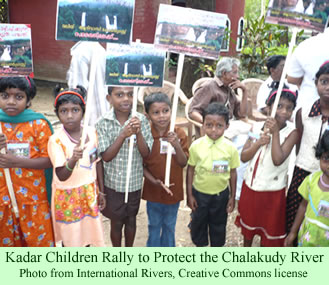The Deccan Herald, an important Indian newspaper, carried a story last week summarizing the protracted, bitter fight over the construction of a 163 mw power dam across the Chalakudy River in Kerala.
 Kanchi Kohli, the author, describes the way the opinions of the Kadar, whose Vazhachal village would be destroyed by the project, and other local communities that are strongly opposed to it, have been ignored by the Kerala State Electricity Board (KSEB). The Kadar have opposed the dam for years.
Kanchi Kohli, the author, describes the way the opinions of the Kadar, whose Vazhachal village would be destroyed by the project, and other local communities that are strongly opposed to it, have been ignored by the Kerala State Electricity Board (KSEB). The Kadar have opposed the dam for years.
The KSEB has campaigned endlessly for it. However, in January last year, the national government’s Minister of Environment and Forests (MOEF) in New Delhi, Jairam Ramesh, reversed the earlier permission given by his agency for the dam. He issued a notice requiring justification from the Kerala government as to why the project should not be cancelled.
The minister cancelled the power project because he finally realized that it would have a severe impact on the Kadar community, and that it would destroy diverse animal and plant species in the area. The article mentions that six other dams have already been built on the river upstream from the proposed construction site, and this last one would eliminate the one remaining stretch of free-flowing river.
Kohli describes the beauty of the relatively untouched forest in the Vazhachal area, where the dam would be built, and the Athirappilly Waterfalls a short ways downstream. Over 10 local communities, in addition to the Kadar village, have also opposed the dam because of its probable effects on their drinking water supplies.
In addition to the Kadar, other groups, expressing their opposition for environmental reasons, have organized meetings and staged satyagraha protests. All of the arguments by the opponents had been dismissed by the Kerala government. The KSEB had indicated, in its environmental impact statement, that there was no local opposition to the project. The author makes clear her own hope for preservation of the river.
Later last week, Mr. Ramesh issued a statement reiterating his opposition to the power project. He said, “There is clear evidence that the project would be ecologically devastating and would destroy rich and valuable biodiversity. Having seen the project site myself, I am more than convinced that the project should not be implemented.”
Mr. Ramesh indicated that he would approach Indian Prime Minister Manmohan Singh, asking him if the central government could compensate the government of Kerala for the cancellation of the power project. He suggested that the national government could allocate more power to the state from the central power pool, or perhaps grant monetary compensation. He said, in his letter to the Chief Minister of Kerala, that he would review this matter with the Prime Minister.
The next day, last Friday, A. K. Balan, the former Electricity Minister for Kerala, held a news conference to blast away at MOEF Minister Ramesh. He raised a variety of arguments, mostly alleging underhanded dealings among government officials in New Delhi, which, he feels, may have helped subvert the dam.